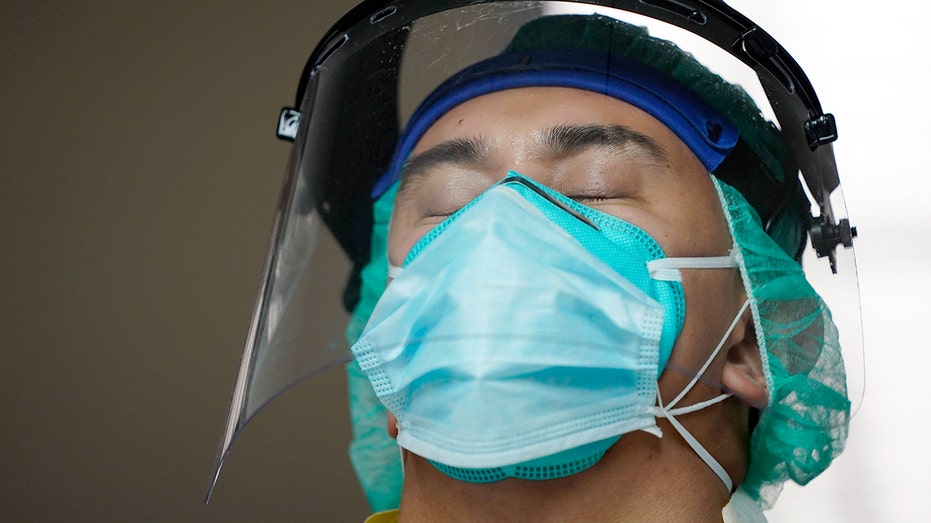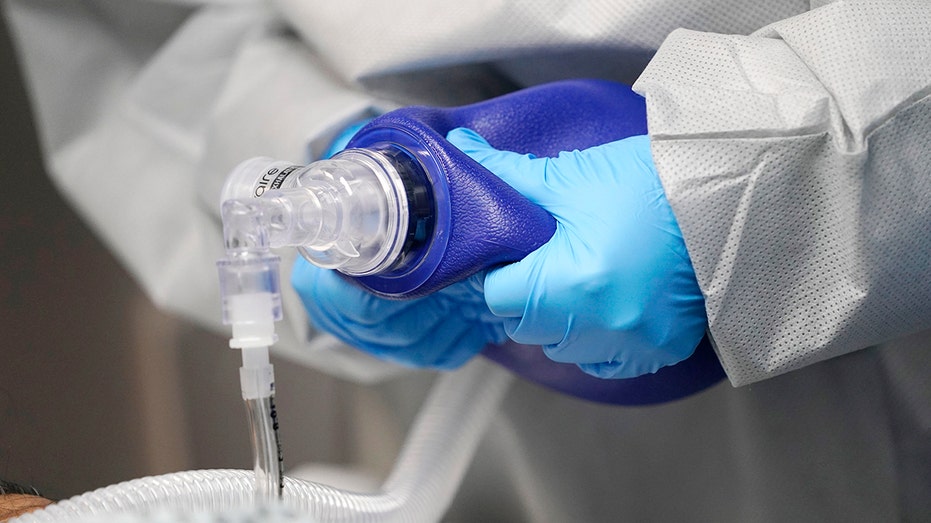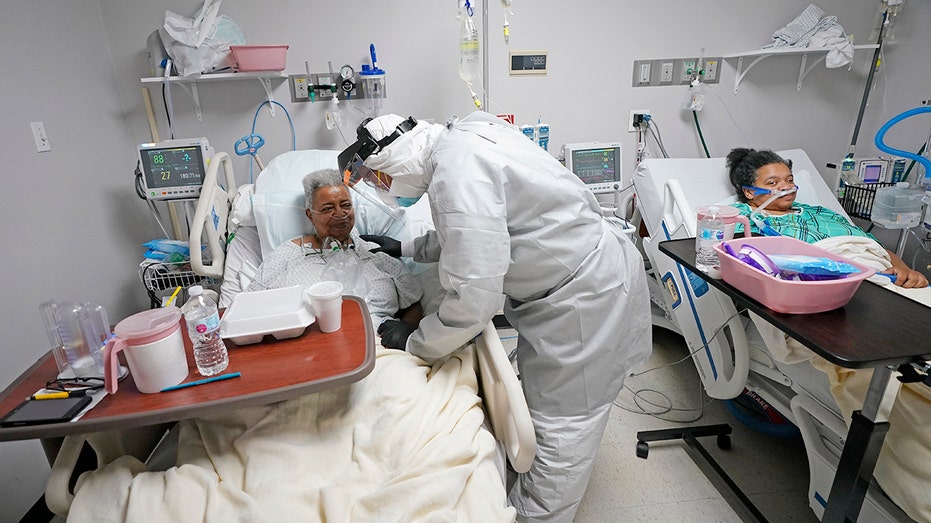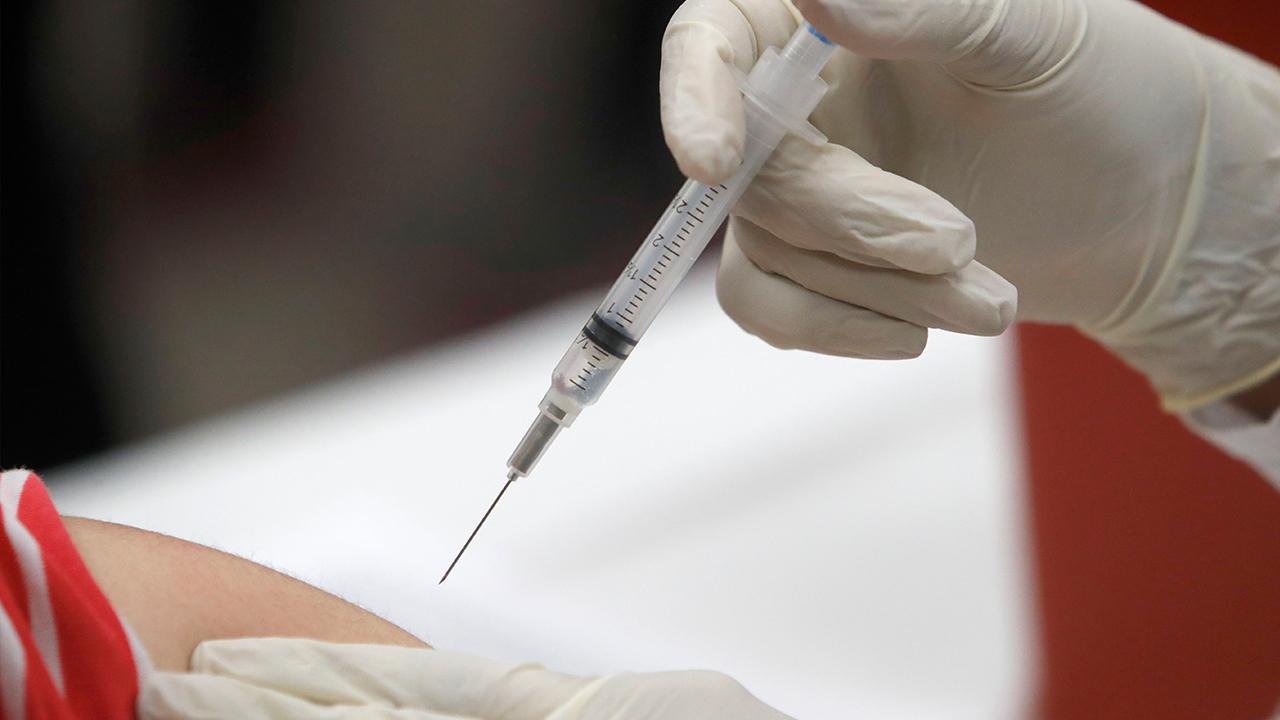A window into the Texas coronavirus surge
'We’re going to get into situations like Italy did, like Spain did, like New York did'
A few weeks after more than 100 people attended her husband’s funeral, the widow herself was on the brink of death.
Her oxygen levels had fallen deadly low due to complications from COVID-19, and her heart stopped. Ten people, each in two layers of protective equipment, surrounded her hospital bed. Two climbed on opposite sides of the bed — one pressing on her chest, the other on her abdomen.
TEXAS GOVERNOR ISSUES MASK ORDER TO FIGHT CORONAVIRUS
At the foot of the bed, Dr. Joseph Varon called out a rhythm: one-two, one-two, one-two.
“Keep on pumping!” he yelled.
But they couldn’t save her.

Medical student Diego Montelongo closes his eyes briefly as he watches others attempt to save the life of a patient inside the Coronavirus Unit at United Memorial Medical Center on July 6, 2020, in Houston. (AP Photo/David J. Phillip)
At least 10 people who were at the funeral later developed coronavirus symptoms, according to her daughter, who fell sick herself. Most people weren’t wearing masks. Her daughter says her mother told her she wished they had been more careful.
“We didn’t take precautions like we should have,” the daughter said. “We just got totally caught up in the moment.”
TEXAS PAUSES CORONAVIRUS REOPENING AS CASES SPIKE
Now, the 66-year-old Latina woman’s death is a grim warning for Texas, which has seen a surge in the number of people testing positive for the coronavirus since it began aggressively loosening restrictions in May. Hospitalizations due to COVID-19 in the state have more than doubled in the last two weeks, and Texas is reporting, on average, more than four times as many cases each day as it was a month ago. It surpassed 10,000 new confirmed cases in a single day Tuesday.

Air is pumped by hand as medical personnel try unsuccessfully to save the life of a patient inside the Coronavirus Unit at United Memorial Medical Center on July 6, 2020, in Houston. (AP Photo/David J. Phillip)
Nearly 80% of the state’s hospital beds are in use, and intensive care units are filling up in some of the nation’s biggest cities, including San Antonio and Houston, where leaders are warning their health facilities could become overwhelmed in the coming days. In all, Texas has recorded more than 2,670 deaths and more than 200,000 confirmed cases of the virus.
While rising case numbers partly reflect more testing, Texas has a positive test rate of 13.5%, more than double the rate from a month ago.
“We’re going to get into situations like Italy did, like Spain did, like New York did just a couple of months ago,” said Varon, board chair at United Memorial Medical Center, a small north Houston hospital.
TEXAS GOV. ABBOTT ORDERS BARS TO CLOSE, LIMITS BUSINESSES AMID SURGE IN CORONAVIRUS CASES
United Memorial has been rapidly dedicating more and more space to virus care. Now, 88 of 117 beds are devoted to such patients — and Varon says the hospital may soon turn over the entire facility to treating those with the virus. Outside, long lines of cars wait hours for tests.
The hospital has taped off three separate wings with a sequence of large tarps and gates. Assisting Varon is a team of nurses and volunteer medical students. Anyone seeing a patient with COVID-19 is required to wear two sets of masks, gowns, gloves, shoe and head coverings, and a face shield.
Varon has worked more than 100 days with barely a rest and normally sleeps just a few hours a night. When he isn’t seeing patients or trying to obtain more hospital supplies, he does media interviews to encourage people to wear masks and take the virus seriously.
“People need to see this so they can understand and won’t do stupid things,” he said, standing in the widow’s hospital room. “Every day, we have stuff like this. Every single day.”
SCIENTISTS 'NOT SURE' WHY CORONAVIRUS IS SURGING IN SOME STATES AND NOT OTHERS: EPIDEMIOLOGIST
The Associated Press, which spent Monday inside the hospital, is not identifying the widow because it was unable to speak to her before her death and is withholding her daughter’s name to protect the mother’s identity.

Dr. Joseph Varon, center, visits with Dorothy Webb, left, and her daughter, Tammie, while making his rounds inside the Coronavirus Unit at United Memorial Medical Center on July 6, 2020, in Houston. (AP Photo/David J. Phillip)
The widow entered the hospital in late June — about a week after the funeral for her husband, who died from liver cancer.
Around 10 a.m. Monday, the widow’s oxygen levels fell dangerously. Varon decided that she needed to be placed on a ventilator. Like many doctors, he has tried to use alternatives to ventilators because of the relatively low survival rate of people on the machines.
When the ventilator failed to restore her oxygen levels, medical staff ran to bring a second one just in case there was a problem with the first. Varon also ordered shocks to her chest and injections of epinephrine, a hormone that stimulates the heart.
“Every effort that you can imagine, everything that has been written, we did, and yet we were unsuccessful,” he said later. “The problem is with COVID, that’s what we’re seeing.”
For most people, the virus causes mild or moderate symptoms. But it can cause severe symptoms in and be fatal for others, especially older adults and people with existing health problems.
CORONAVIRUS TAKING STRONGER HOLD IN US, OTHER POPULATED COUNTRIES
Next door to the widow was LaTanya Robinson, who was breathing with a machine providing high-flow oxygen through her nose and could see hospital staff running into the widow’s room as they tried to save her. Monday was the first day Robinson felt well enough to have a conversation about her illness.
The 51-year-old says she cared for her adult son when he got the virus. Both she and her husband eventually caught it. While her son and husband’s symptoms were relatively mild, she went from feeling tired and struggling to move to hardly being able to breathe.
Robinson says she was held in an urgent-care center for two days before being moved to United Memorial because the first available hospital beds were in Corpus Christi and Lufkin, cities at least a two-hour drive away.
Texas leaders say there are still 12,000 available hospital beds statewide — about 23% of total beds. But Robinson’s case shows that even if the sprawling state still has spare capacity, that may not accommodate people in cities where the virus is surging.
Robinson’s son had recently spent time outside the house and his girlfriend had gone out with friends. She thinks one of them may have originally gotten the virus and infected her, but isn’t certain.
Asked what she would tell people outside the hospital about the virus, she said: “The only thing I can do is to live to be that example for them. You don’t take anything for granted.”
United Memorial, already near capacity, could soon be filled, Varon says, as he braces to see what 4th of July celebrations might bring. Some people gathered for the holiday even as Abbott instituted new restrictions on outdoor get-togethers and required mask-wearing indoors.
GET FOX BUSINESS ON THE GO BY CLICKING HERE
After Varon’s team did three rounds of compressions on the widow, he stopped them. “Thank you, everybody,” he said. The 10 people around the bed filed out of the room, one of them sighing. The machines around her continued to beep.
A few people worked to prepare her body for the undertaker and placed a sheet over her.
Varon called the widow’s daughter, expressing condolences first in Spanish, then English. He repeated that he had done everything he could and to call if there was anything she needed.
When he hung up the phone, his bluish gray eyes were filled with tears.
“That’s the one thing you don’t want to do when you’re a doctor,” he said. “But you’ve got to do it. Somebody has to do it.”
CLICK HERE TO READ MORE ON FOX BUSINESS




















